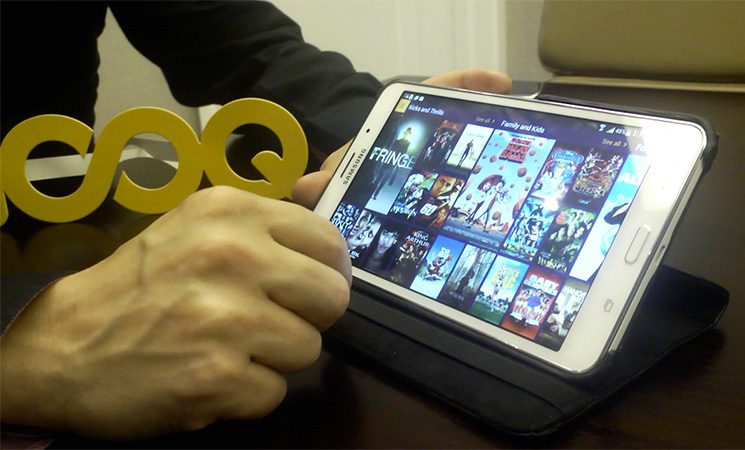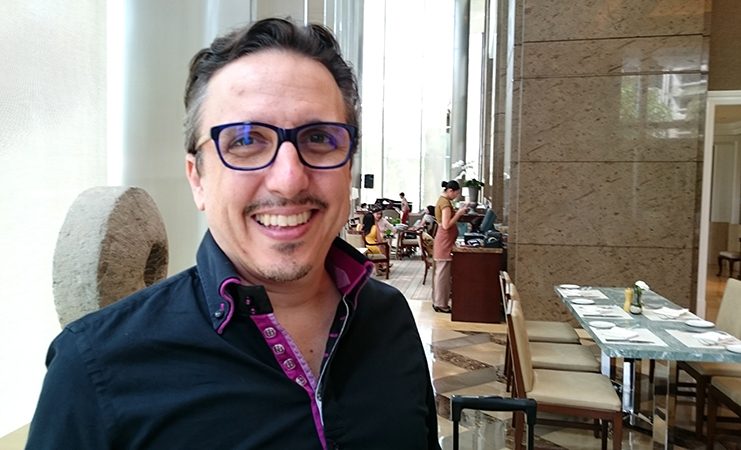SUMMARY
This is AI generated summarization, which may have errors. For context, always refer to the full article.

MANILA, Philippines – Millions of new Internet users in the Philippines and the greater Asian region are beginning to realize how subscription video on demand (SVOD), media streaming services like Netflix, can enrich their lives and open doors for firms to capitalize.
“When people start to use the Internet for the first time, they’ll probably do a search on Google, then join Facebook, and watch videos on YouTube. Over time, that user will graduate into more sophisticated streaming services like Spotify for music or HOOQ for TV shows and movies that will enrich your live with great content,“ said HOOQ founder and CEO Peter Bithos in an exclusive interview with Rappler.
HOOQ, a start-up joint venture between Sony Pictures, Warners Brother studio, and lead investor Singtel, is the first of the premium SVOD services to set up in Asia. It officially launched its service in the Philippines first in January of 2015, and is now present in Singapore, India, Indonesia, and Thailand.
The service allows users to stream movies and TV shows from different Hollywood entertainment studios and mixes them up with local movies and shows for an affordable price.
“What we see is a huge wave of customers. Millions and millions of Filipinos are now realizing what you can do with the service like HOOQ, and we’re getting an amazing response,” Bithos said.

Started in the Philippines
HOOQ strategy is to create a presence in emerging markets in Asia. And the Philippines was the ideal country to start off as the firm believes the stage is set for streaming services to take hold in the country.
“The Philippines, from a professional perspective, has got a couple of things going for it. Firstly, Filipinos are very content-savvy. They’re very familiar with both Hollywood and local content. Secondly, Filipinos are very digitally-savvy and the success of Spotify, Facebook, and many other services in the Philippines convinced us this was a great place to start,” Bithos explained.
HOOQ is also very confident that in the next two to 3 years, over half of the Philippines’ population will have smartphones, he added.
Despite the country’s problematic Internet infrastructure, Bithos said, it compares favorably to other countries in the region with at least 3G connections in many rural areas and large LTE depoyments already.
“The bandwidth problems will, although you will want more, will be in much better shape in a few years than they are today. But now is the right time to start because you have to plan for the future. If you wait until everything’s ready, you’re too late,” he said. (READ: New Internet speed minimum throwback to ’90s?)
Geared for emerging markets
To get around these challenges, HOOQ’s service is specifically designed for developing nations. As such, it has a number of features that Netflix in the US and rivals in the region do not, such as the ability to download movies for offline use.
“At HOOQ, we are focused totally on emerging markets like the Philippines. We understand that it’s not like San Francisco, US, where you have bandwidth on tap whenever you want,” Bithos explained.
Another feature that makes HOOQ stand out is in the degree of importance it places on local content.
The firm aims for a 60-40, local-to-Hollywood content split in every country its in, specifically to cater to the different tastes of people coming online for the first time.
“Emerging markets are places where people have slightly different situations and different tastes than, say, somebody in San Francisco which is why we have the largest local catalog of any player in the market place,” Bithos explained.
For instance, the firm recently announced a deal with television network GMA to run their shows 24 hours after it premieres on TV.
HOOQ’s pricing scheme is also reflective of the emerging market focus, charging P149 per month for unlimited videos, far lower than the average price of $10 that services in the West charge.
On top of that, the firm has also partnered with Globe Telecom, which allows subscribers to access the service for free at certain data plans.
If you have a data plan for P299 ($6.41) and above, you get HOOQ bundled in with your data plan. Or if you take a broadband home plan for P1299 ($27.83) and above, it is included in your home broadband, Bithos explained.
“We are also very fortunate in our distribution partnership that Globe has allocated a set of data. It does not count data from HOOQ usage against your normal wallet,” he added.
Bithos conceded that the piracy, so prevalent in the region, “will always exist” but is confident that providing a convenient service at affordable rates will convince the majority to subscribe to an SVOD service instead.
“After all no one wakes up in the morning saying, ‘I want to pirate content,’” he said.

Rise of streaming services globally
Bithos’ confidence in the rise of streaming services in the region is reinforced by studies that show that SVOD demand is set to surge dramatically throughout the world in the next decade.
According to a recent report on the Global OTT TV & Video Forecasts from Digital TV Research, a UK-based media research firm, the number of homes globally with SVOD subscriptions will rise by 485% from 20 million in 2010 to about 120 million by end-2015.
By 2020, the total number is expected to reach 250 million, up over 1000% from 2010.
This trend is starting to take root in the country as well. In a report released late 2014 by global information firm Nielsen, it showed that about 7 in 10 digital consumers in the Philippines reported watching TV content and movies via online sources such as video-on-demand.
Apart from HOOQ’s partnership with Globe Telecom, rival Smart Communications also launched a partnership with streaming service iflix in June of this year.
Bithos said that the sheer number of potential users in the country will eventually attract big international players like Netflix to enter the market but is confident that HOOQ’s model of catering specifically to Filipino’s tastes will allow it to standout from the crowd.
“They will definitely come and you’re going to have lots of choice as a customer and that’s great news for Filipino customers. Our focus is not to be Netflix but to be the best service for Filipinos,” he said. – Rappler.com
$1 = P46.68
Add a comment
How does this make you feel?
There are no comments yet. Add your comment to start the conversation.